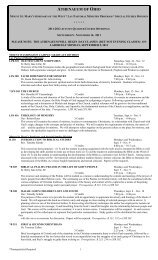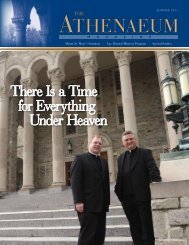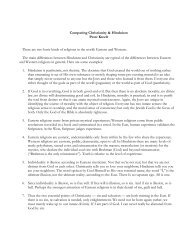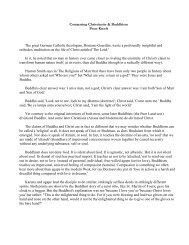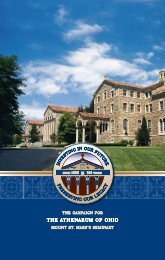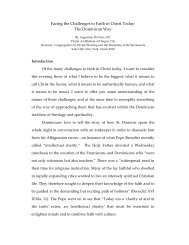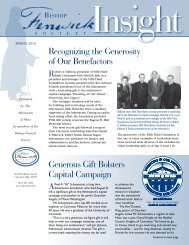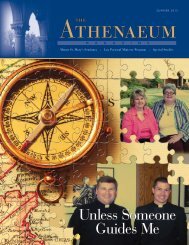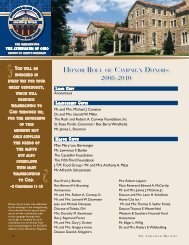Notes from Gathered for the Journey Six (6) essays David McCarthy
Notes from Gathered for the Journey Six (6) essays David McCarthy
Notes from Gathered for the Journey Six (6) essays David McCarthy
Create successful ePaper yourself
Turn your PDF publications into a flip-book with our unique Google optimized e-Paper software.
o How generous can one be with time and treasures with four children—twoin college and one in Catholic high school? Prudence grounds <strong>the</strong> moralreflection in reality—―<strong>the</strong> prudent person uses good sense she is capableof to choose well concerning all activities in this world.‖ (203, emphasisadded)III. Cardinal Virtues as <strong>the</strong> Path to <strong>the</strong> Good Life in This Worldpp 202 – 206The Path to Good LifeChallenge—to argue that <strong>the</strong> cardinal virtues ―may rightly be called to <strong>the</strong> path to<strong>the</strong> good life in this world.‖ (203)Someone may say <strong>the</strong>se virtues are helpful, but can we really argue that <strong>the</strong>y are<strong>the</strong> ―hinge‖ (cardo) ―of a good life in this world‖?Historically, <strong>the</strong> cardinal virtues are consistently ―center stage‖Mattison‘s first argument is <strong>from</strong> <strong>the</strong> classic quality of <strong>the</strong>se virtues—<strong>from</strong> Platoand Aristotle, through <strong>the</strong> Jewish scriptural tradition and into Christian thinking(204)Look to natural law to account <strong>for</strong> this consistency—hence <strong>the</strong> interlockingquality of Cloutier, Dillon and <strong>McCarthy</strong>‘s <strong>essays</strong>.All rational people encounter life-situations demanding <strong>the</strong>se virtues, so <strong>the</strong>irreasonableness lies open to all reasonable persons—such universality is axiomaticto natural law reasoning. (204)What if we disagree about ―right‖ and ―wrong‖?All voices in <strong>the</strong> Western tradition—and surely in <strong>the</strong> Eastern tradition—do not,however, exhibit undivided solidarity in what is morally right and wrong.We could look to Aristotle‘s solution—<strong>the</strong> mean (ma<strong>the</strong>matically, speaking). Is<strong>the</strong> ―mean‖—<strong>the</strong> middle between to extremes a good model to referee thisquestion? (204) Example, establishing <strong>the</strong> mean of chastity between extremes ofpromiscuity and prudishness.At first blush—maybe—but in <strong>the</strong> end we still must ask what comprises―promiscuous‖ behavior as distinguished <strong>from</strong> ―prudish‖ behavior vis a vis <strong>the</strong>virtue of chastity. (205)When all <strong>the</strong> smoke clears, we end up having an all-too-<strong>for</strong>mal structure –notidentical, surely, but suffering <strong>from</strong> Kant‘s problems.Look to <strong>the</strong> fundamental narratives of <strong>the</strong> community―What guards against a contentless morality is <strong>the</strong> reliance of <strong>the</strong> virtue approachon paradigmatic actions to exemplify each virtue.‖ (205)We look to virtue in warfare (prescinding <strong>from</strong> <strong>the</strong> justice of a particular conflict).Fundamental Moral Theology Page 50 of 54Class <strong>Notes</strong> – Fa<strong>the</strong>r Michael Seger



